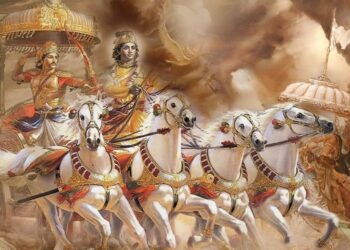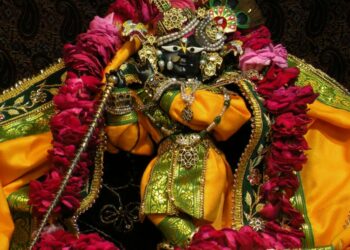TEXT 21
nirāśīr yata-cittātmā
tyakta-sarva-parigrahaḥ
śārīraṁ kevalaṁ karma
kurvan nāpnoti kilbiṣam
SYNONYMS
nirāśīḥ—without desire for the result; yata—controlled; citta-ātmā—mind and intelligence; tyakta—giving up; sarva—all; parigrahaḥ—sense of proprietorship over possessions; śārīram—in keeping body and soul together; kevalam—only; karma—work; kurvan—doing; na—never; āpnoti—does acquire; kilbiṣam—sinful reactions.
TRANSLATION
Such a man of understanding acts with mind and intelligence perfectly controlled, gives up all sense of proprietorship over his possessions, and acts only for the bare necessities of life. Thus working, he is not affected by sinful reactions.
PURPORT
A Kṛṣṇa conscious person does not expect good or bad results in his activities. His mind and intelligence are fully controlled. He knows that because he is part and parcel of the Supreme, the part played by him, as a part and parcel of the whole, is not his own activity but is only being done through him by the Supreme. When the hand moves, it does not move out of its own accord, but by the endeavor of the whole body. A Kṛṣṇa conscious person is always dovetailed with the supreme desire, for he has no desire for personal sense gratification. He moves exactly like a part of a machine. As a machine part requires oiling and cleaning for maintenance, so a Kṛṣṇa conscious man maintains himself by his work just to remain fit for action in the transcendental loving service of the Lord. He is therefore immune to all the reactions of his endeavors. Like an animal, he has no proprietorship even over his own body. A cruel proprietor of an animal sometimes kills the animal in his possession, yet the animal does not protest. Nor does it have any real independence. A Kṛṣṇa conscious person, fully engaged in self-realization, has very little time to falsely possess any material object. For maintaining body and soul, he does not require unfair means of accumulating money. He does not, therefore, become contaminated by such material sins. He is free from all reactions to his actions.
TEXT 22
yadṛcchā-lābha-santuṣṭo
dvandvātīto vimatsaraḥ
samaḥ siddhāv asiddhau ca
kṛtvāpi na nibadhyate
SYNONYMS
yadṛcchā—out of its own accord; lābha—with gain; santuṣṭaḥ—satisfied; dvandva—duality; atītaḥ—surpassed; vimatsaraḥ—free from envy; samaḥ—steady; siddhau—in success; asiddhau—failure; ca—also; kṛtvā—doing; api—although; na—never; nibadhyate—becomes affected.
TRANSLATION
He who is satisfied with gain which comes of its own accord, who is free from duality and does not envy, who is steady in both success and failure, is never entangled, although performing actions.
PURPORT
A Kṛṣṇa conscious person does not make much endeavor even to maintain his body. He is satisfied with gains which are obtained of their own accord. He neither begs nor borrows, but he labors honestly as far as is in his power, and is satisfied with whatever is obtained by his own honest labor. He is therefore independent in his livelihood. He does not accept engagement in anyone’s service if it might hamper his own service in Kṛṣna consciousness. However, for the service of the Lord he can participate in any kind of action without being disturbed by the duality of the material world. The duality of the material world is felt in terms of heat and cold, or misery and happiness. A Kṛṣṇa conscious person is above duality because he does not hesitate to act in any way for the satisfaction of Kṛṣṇa. Therefore he is steady both in success and in failure. These signs are visible when one is fully in transcendental knowledge.




















